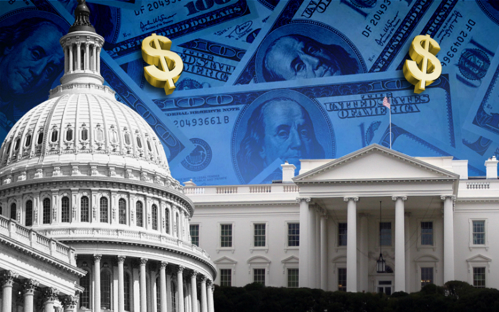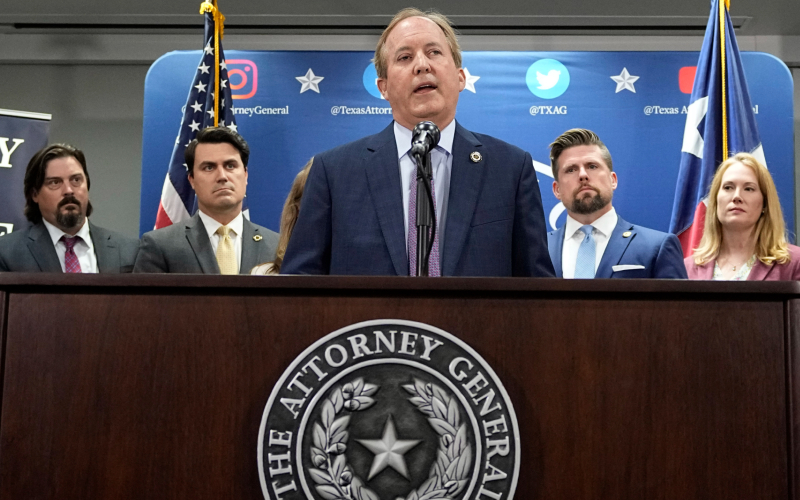President Donald Trump’s proposed federal budget for 2026, released Friday, will be “historic” if Congress can get it approved, says House Republican Mark Harris. The budget proposes $163 billion in cuts, including a 23% cut for non-defense discretionary spending, the largest cut since Trump’s first term in 2017.
It does not include cuts to Social Security and Medicare – but it does include cuts to the Centers for Disease Control and Prevention (CDC) and National Institutes of Health by more than 40% and to the Internal Revenue Service (IRS) by $2.49 billion.
 Meanwhile, there’s increased spending to secure the border – a record request of $1 trillion for national security – and increases for rail safety and infrastructure grants and for school choice. The budget seeks an additional $500 million for charter schools, a boost of $60 million compared to the 2025 budget.
Meanwhile, there’s increased spending to secure the border – a record request of $1 trillion for national security – and increases for rail safety and infrastructure grants and for school choice. The budget seeks an additional $500 million for charter schools, a boost of $60 million compared to the 2025 budget.
“It’s really the President’s agenda that’s being unfolded here. The previous administration treated the federal budget like it was a slush fund. This budget, if we’re able to move this through Congress, is going to be of historic proportion,” Harris said on Washington Watch Friday.
As director of the Office of Management and Budget (OMB), Russell Vought played a key role in creating Trump’s budget.
Diversity Equity and Inclusion (DEI) initiatives from the previous administration, United States Agency for International Development (USAID) and “environmental justice” are all targeted in the budget, Harris, who represents North Carolina’s Eighth District, told show host Jody Hice.

“It’s really just getting the American taxpayer off the hook for the $100 million that we've been having to pay for the Biden administration's progressive Democrat agenda,” he said.
Overall, discretionary spending would be set at $1.7 trillion.
“Anytime you're able to make these kinds of significant savings in spending, I think it's a major win. Washington is not an easy place to claw back spending,” Harris said.
Clearly, though, not everyone believes “historic” is a good thing.
Budget backlash from NPR
Trump issued an executive order on Thursday instructing the Corporation for Public Broadcasting (CPB) to cease funding for National Public Radio (NPR) and its television sister, Public Broadcasting System (PBS). The White House describes both as presenting “biased and partisan news coverage.”
The CPB was established by Congress to be independent with the statute expressly forbidding any department, agency, officer or employee of the United States from exercising any direction, supervision or control over educational television or radio broadcasting or over the CPB.
 The Trump budget’s allocation for NPR and PBS isn’t zero but represents 0.0001% of spending.
The Trump budget’s allocation for NPR and PBS isn’t zero but represents 0.0001% of spending.
NPR quickly tried to make its loss of funding about free speech, which it’s not, writes Matt Vespa at Townhall.com.
“The liberal outlet isn’t shut down. It’s not being muzzled. It just won’t get our money to shovel insufferable woke nonsense down our throats,” Vespa wrote.
Nevertheless, NPR CEO Katherine Maher is appalled and issued a statement of 618 words in length, denying Trump’s claims of bias and pledging to fight the executive order.
“We stand by our high standards and our colleagues in their pursuit of factual reporting, their work to present issues fairly and without bias, and our effort to seek the humanity and human consequence of every story,” Maher said.
She said NPR will “strongly defend our work and our editorial independence and will continue to tell the stories of our country and the world with accuracy, objectivity and fairness.”
Maher said her organization will challenge the EO by all means available.
NASA’s Mars program too expensive to continue
Leaders of the National Aeronautics and Space Administration (NASA) have government oversight and may not feel comfortable voicing opposing viewpoints. But they can’t be happy with a budget that cuts its funding by $6 billion, a 24% cut – its largest ever in a single year.
 Among the cuts are a plan to bring samples from the surface of Mars back to Earth and a planned moon-orbiting space station.
Among the cuts are a plan to bring samples from the surface of Mars back to Earth and a planned moon-orbiting space station.
“Slashing NASA’s budget by this much, this quickly, without the input of a confirmed NASA Administrator or in response to a considered policy goal, won’t make the agency more efficient – it will cause chaos, waste the taxpayers’ investment, and undermine American leadership in space,” wrote The Planetary Society, an independent nonprofit organization that promotes space exploration.
NASA’s Mars Sample Return (MSR) program is currently running $4 billion beyond its proposed cost of $7 billion.
Trump’s budget proposes to “terminate unaffordable missions” and calls MSR “grossly overbudgeted.”
The budget emphasizes the importance of NASA beating China back to the moon and putting the first humans on Mars, the latter being achieved by Elon Musk’s company, SpaceX, The Daily Mail reported.
“This budget, as overseen by OMB Director Russell Vought, is not supportive of President Trump’s own stated goal that America must ‘lead the way in fueling the pursuit of space discovery and exploration.’ The OMB’s budget proposal is fundamentally at odds with the President’s vision for American space leadership,” writes The Planetary Society.







